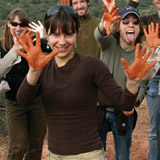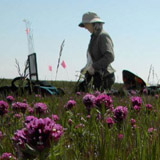Q&A Presents: A Special Anniversary Interview
In this special edition of Breakthroughs Q&A, the planet Earth interviews the Department of Environmental Science, Policy, and Management (ESPM) on the occasion of the department’s 20th anniversary.
Earth: The rest of the planets have been concerned and are asking me, “What’s up with your complexion?” I keep telling them I’ve had an outbreak of Homo sapiens, but they obviously can’t relate. Maybe you can help me understand more about these blemishes I started to experience a few thousand years or so ago?
ESPM: We’re humbled that you’re coming to us for help. Around the time we formed the department, many people were starting to recognize that humans had made so many modifications to your surface that we had entered the geological epoch of humans, which has been referred to as the Anthropocene. The name is a recognition of our close partnership with you. As you know from being around the last 4.5 billion years, the boundary between one geological period and another is commonly marked by catastrophic environmental change and mass extinction.
Earth: Yikes. Now that you mention it, I’ve been feeling a little feverish lately. I’m a bit dehydrated and I keep catching fire.
ESPM: We’ve noticed you’re changing, too, and that we have a lot to do with it. So, 20 years ago we decided that to “save the Earth” (pardon the expression), we needed to have a mission of translating science into meaningful policy and educating a new generation of students to become leaders and innovators in environmental change.
The real challenge was that there was no program like this, so we merged several existing departments—many that had long Berkeley traditions, including forestry and agriculture, into one. It wasn’t a painless transition, but we realized that change and evolution are good (a lot better than extinction), and in the process, we were able to come up with a blueprint of how to do things differently—and better. We are now one of the most vibrant and exciting departments on the Berkeley campus and in the country. Our motto, “Our Environment at Berkeley,” gets to the heart of what we are about: We believe that the environment is not some pristine forest in a remote mountainous landscape; it is our home, our community, and the future we hope our children will experience.
Earth: Just because you have all these people together now, does it really mean you can, as you say, save me?
ESPM: A lot is going to happen in the next 50 years—your climate will change, your reserves of oil will run out, your areas of new cultivable land will cease to exist, and we will outgrow what you can provide us. We hope to at least have a positive impact, and we believe that the ways ESPM has changed will allow us to do so. Being together and working toward a shared mission really does change what people do. Our teaching and research are geared toward ways to live within the resources of what a small rocky planet can provide.
CENTENNIAL: Cal Forestry turns 100!
For example, we realized that the hunting of African wildlife for food is driven by social and economic pressures, and thus we have launched the Biodiversity, Health, and Livelihoods program to develop strategies that alleviate poverty and decrease the pressure on biodiversity. As climate changes, the management of forests to prevent catastrophic wildfire is critical. Our Center for Fire Research and Outreach is the go-to voice for fire policy and management in the western United States and beyond. Soil is the foundation of civilizations, and ESPM continues its long history of international leadership in managing and preserving soil in agricultural and non-ag settings.
Earth: So, is this what that “one Earth is not enough” ruckus is all about? It’s always something with you guys.
ESPM: In the past several decades, human society has been consuming a bit more than what you annually provide for us or can naturally replace. Actually, most of us in ESPM believe you provide plenty for us. We just need to improve the ways we produce and distribute food, produce and recycle consumer goods, harness and conserve energy, and manage the soil and water.
Earth: Hmmm, that’s a pretty big task list.
ESPM: True, but UC Berkeley is a big place, and ESPM is part of the great strides that the University is taking to address these goals. We helped launch the new Berkeley Food Institute, which is facilitating research and education opportunities in the science and policy of modern food systems. We are key partners in the Berkeley Initiative for Global Change Biology, a program geared toward shepherding our ecosystems through the changes of this century. Our faculty and students are leaders in the Berkeley Center for Science, Technology, Medicine, and Society and in the Berkeley Center for Green Chemistry. Some have even started public-benefit corporations, like Good Guide, which puts expert advice on the environmental and social impacts of consumer goods right in the mobile phones we carry. Some of our faculty and staff have also worked with the state to create cal-adapt.org, an interactive website that helps people understand how climate change will affect California.
Earth: Well, this seems like it might help. I was recently talking to Venus and Mercury about what to do with all of you. Mercury suggested I just boil off my atmosphere and that would take care of it. However, I really like the blue complexion all the humidity gives me. And, of course, I wouldn’t want to wind up like Mars! We all get lots of laughs joking about how rusty Mars is. Whenever he orbits near us, we all yell, “Take off that red shirt!!!”
ESPM: Hmmm. We have a small private institution down the road that’s sort of rusty and lifeless, too.
Earth: It certainly sounds like you’ve done a lot in just 20 years as a department, but you can’t solve all my problems by yourselves.
ESPM: You are exactly right, so we are betting that our undergraduate students will be a leading force for change. ESPM now has more than 800 undergraduate students in five majors! And we are still growing. Our students are concerned about their future, the food they eat, the climate they will live in. But the most important thing about these students is that they are incredibly bright and want to do something about the world that they are inheriting. They have a lot at stake.
And, while we are excited about how fast we are growing, we are also proud of the small-college experience we provide these students. In fact, ESPM just became one of only 10 departments on the campus to participate in the
Berkeley Connect undergraduate mentorship program, which places students in a small group of peers that meets once a week with a graduate-student mentor. The students also get one-on-one mentoring, fun lessons about the campus’s storied history, trips to our museums, and guidance on how to navigate through the Berkeley system—all with a free dinner! In just our first semester, we are already approaching our ultimate goal of 300 participants.
Earth: That sounds great! I try to keep a down-to-Earth outlook on life, but I have to say, you’ve inspired me. If the Anthropocene has this bright generation to keep an eye on me, color me optimistic. Happy anniversary, ESPM!







